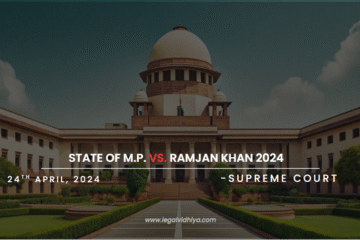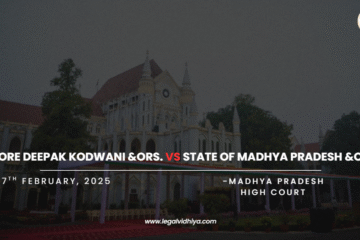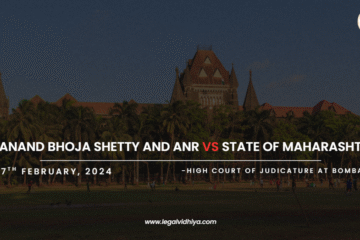
| Citation | 2024 SCC OnLine SC 554 |
| Date of Judgement | 18th April 2024 |
| Court | Supreme Court of India |
| Appellant | State of Arunachal Pradesh |
| Respondent | Kamal Agrawal and Ors. |
| Bench | Vikram Nath and K. Viswanathan, JJ. |
INTRODUCTION
In this case two sets of court cases are involved in this matter, which originated with a First Information Report (FIR) No. 227 of 2017 filed at the Pasi Ghat Police Station in the District of Siang East, Arunachal Pradesh. In his capacity as an attorney representing M/s Shiv Bhandar’s owner, Mr. Okep Tayeng, Mr. Anil Agarwal filed the FIR. Sections 420 (cheating), 120B (criminal conspiracy), and 34 (acts done by multiple individuals in furtherance of same intention) of the Indian Penal Code were allegedly violated in the charges. A number of people were accused of deceiving M/s Shiv Bhandar in a transaction involving Rs. 1 crore, which was reportedly for the acquisition of property or a building in Jaipur, Rajasthan, and the complaint was directed at them.
Chandra Mohan Badaya was among the three defendants who first petitioned the Gauhati High Court to have the FIR quashed, but their case was turned down. Badaya then petitioned the Supreme Court for a Special Leave Petition (SLP). Five other co-accused individuals successfully quashed the FIR by filing comparable petitions at the Rajasthan High Court during this time.
The key concerns centred on the Arunachal Pradesh authorities’ territorial authority to file and look into the First Information Report (FIR), considering that all participants and purported transactions were situated in Rajasthan. More appeals were prompted by the divergent rulings on this jurisdictional issue reached by the High Courts in Gauhati and Rajasthan. After concluding that the case involved financial transactions and lacked a clear criminal component, the Supreme Court quashed the FIR and all associated proceedings, overturning the Gauhati High Court’s orders and upholding the Rajasthan High Court’s ruling.
FACTS OF THE CASE
- The case started with File No. 227 of 2017, which was filed in District Siang East, Arunachal Pradesh, at Police Station Pasi Ghat. On behalf of Mr. Okep Tayeng, the owner of M/s Shiv Bhandar, Mr. Anil Agarwal filed the FIR. According to Section 34 of the Indian Penal Code, the FIR charges many people of acting in concert with a common aim (Section 34), criminal conspiracy (Section 120B), and cheating.
- M/s Shiv Bhandar paid Rs. 1 crore in four instalments to the accounts of Rajesh Natani, his proprietorships, and Chandra Mohan Badaya in 2016. The complaint believes the transfer was made for the purpose of buying land and structures in Jaipur, Rajasthan, whereas Badaya contends it was a loan.
- Badaya claims that he completed two sale documents for properties in Jaipur valued at over Rs. 1.08 crore and reimbursed the complaint for Rs. 37 lakhs. According to the complaint, the accused caused financial loss and emotional suffering by refusing to transfer the agreed-upon property.
- Chandra Mohan Badaya was one of the three defendants who filed a plea to have the FIR quashed, but their request was denied. The State of Arunachal Pradesh filed Special Leave Petitions in the Supreme Court after five more co-accused successfully petitioned to have the FIR quashed. Since all parties and transactions were headquartered in Rajasthan, the main legal question was whether the Arunachal Pradesh authorities had the geographical jurisdiction to look into the case.
- The Supreme Court determined that there was no convincing evidence of a criminal offense and that the disagreement was of a civil nature concerning financial transactions. The complainant’s right to a remedy in civil court rather than through criminal procedures was acknowledged by the court. As a result, the FIR was dismissed along with all associated procedures.
ISSUES RAISED
- Whether the Arunachal Pradesh authorities had the right to file the FIR and conduct an investigation as all parties, transactions, and the property in dispute were based in Rajasthan?
- Whether the matter was only a civil/commercial disagreement involving a financial transaction, or if it involved criminal charges of fraud, deception, and deceit; and thus, whether the FIR ought to be dismissed?
- Whether the accused’s claim that the FIR was an abuse of the legal system and did not reveal any crimes that might be prosecuted should be upheld?
- Whether the actions and the outcome should be affected by the legal discrepancy between the Rajasthan High Court’s quashing of the FIR for additional co-accused and the Gauhati High Court’s dismissal of the petition to quash the FIR?
CONTENTION OF APPELLANT
- The appellant contended that since all persons, properties, and transactions were situated in Rajasthan, where the alleged violations were committed, the FIR had to be dismissed. As a result, the Arunachal Pradesh authorities lacked the geographical jurisdiction necessary to file and look into the FIR.
- Then they argued that there was no formal agreement in place and that the disagreement was solely civil in character because it included a pecuniary transaction. The appellant contended that this was not a criminal case of deception or conspiracy, but rather a civil case for the courts to decide.
- They mentioned that he had completed two sale deeds for properties valued at over Rs. 1.08 crore in the complainant’s representatives’ favour and had reimbursed the complainant for Rs. 37 lakhs. This disproved accusations of cheating by indicating a partial completion of the financial transaction.
- They claimed that the FIR constituted a misuse of the judicial system as it failed to reveal any crimes that might be prosecuted. There was no illegal activity involved in the financial transaction issues.
- Then finally they argued that there should be a resolution to the mismatch between the Rajasthan High Court’s order to quash the FIR for other co-accused and the Gauhati High Court’s dismissal of the petition to quash the FIR.
CONTENTION OF REPONDENT
- The respondent contended that the complaint, M/s Shiv Bhandar, had an address in Pasighat, East Siang District, Arunachal Pradesh, and hence the FIR was legitimately filed in that state. This gave the authorities of Arunachal Pradesh a foundation for their territorial control.
- Then they argued that fraud, conspiracy, and deception were crimes committed in this case. They insisted that the accused had committed a criminal offense by collecting money for the sale of property and then refusing to transfer the property, therefore purposefully misleading the complaint.
- Their reply highlighted that the plea to quash the FIR had been denied by the Gauhati High Court, suggesting that at that point in time there were no extraordinary circumstances to support stopping the criminal proceedings.
- Based on the FIR, the respondent claimed that the Arunachal Pradesh police were entitled to investigate the incident and that the investigation should be permitted to continue in order to ascertain the facts and gather evidence.
- The respondent said that the complainant, who claimed significant financial loss and emotional suffering as a result of the accused’s activities, would be prevented from pursuing justice if the FIR were quashed. The answer stressed the need of handling the accusations via the appropriate legal processes.
JUDGEMENT
The FIR No. 227 of 2017, which was filed at the Pasi Ghat Police Station in the District of Siang East, Arunachal Pradesh, was invalidated by the Supreme Court, along with all related proceedings. The Court found that there were no overtly criminal aspects to the disagreement, which was solely civil in character and included money transactions. Rather of pursuing criminal procedures, the complainant’s appropriate course of action was to pursue relief via civil court. The Rajasthan High Court’s conclusion that no portion of the claimed offense took place in Arunachal Pradesh was accepted by the court. Because all of the participants, properties, and transactions were based in Rajasthan, the authorities in Arunachal Pradesh do not have territorial jurisdiction over this case. The Court determined that there was no cognizable offense revealed in the FIR that called for a criminal inquiry and prosecution. It was mentioned that Chandra Mohan Badaya, the appellant, had partially complied with his duties by transferring property and making repayments.
The Supreme Court quashed the proceedings in order to address the discrepancy between the orders of the Rajasthan High Court and the Gauhati High Court. It concluded that the Rajasthan High Court made the right decision in dismissing the FIR, and it ought to be upheld. The State of Arunachal Pradesh filed appeals, but the Court dismissed them, questioning the need for their challenge given that the plaintiff abandoned the case. The whole case process pertaining to FIR No. 227 of 2017 was quashed when the Supreme Court overturned the decision made by the Gauhati High Court and granted Chandra Mohan Badaya’s appeal.
ANALYSIS
After considering the jurisdictional concerns, the Supreme Court determined that the authorities of Arunachal Pradesh lacked territorial jurisdiction because all pertinent properties, activities, and parties were situated in Rajasthan. This emphasized how crucial it is to register and look into criminal matters in the appropriate court. The Court found that there was a civil issue as opposed to a criminal one. It was obvious from the lack of a formal written agreement governing the financial transactions and Chandra Mohan Badaya’s partial reimbursements that this was a business dispute that was better handled in civil court. The study revealed that no illegal activity that would have justified police engagement was included in the FIR. Since the accusations were more closely related to contract violations than to fraud or deception, it was decided that criminal prosecution was not warranted. The ruling cited well-established legal precedents, including those from the State of Haryana v. Bhajan Lal case, which outlined the procedures for dismissing false police reports (FIRs) that fail to reveal a prima facie cognizable offense.
The Supreme Court carefully considered the circumstances and admissible arguments before addressing the divergent rulings made by the Rajasthan and Gauhati High Courts. It was determined that the Rajasthan High Court’s justification for dismissing the FIR was more in line with the parameters of jurisdiction and the nature of the disagreement. The Rajasthan High Court’s decision to quash the FIR was questioned by the analyst, particularly since M/s Shiv Bhandar, the complainant, chose not to challenge the ruling. This prompted questions over the right role for state authorities to pursue appeals in civil matters that are being prosecuted as criminal proceedings. The Supreme Court’s ruling, which emphasized the need to distinguish between civil and criminal cases and made sure that jurisdictional requirements be followed to prevent abuse of the legal system, provided clarity and uniformity to the court processes.
CONCLUSION
The Supreme Court found that Arunachal Pradesh’s FIR No. 227 of 2017 should be dismissed since it dealt with a civil dispute rather than a criminal offense. Since the case concerned property agreements and financial activities that were concentrated in Rajasthan, it was outside the purview of the authorities in Arunachal Pradesh. The Court emphasized the improper use of criminal procedures in what was basically a business dispute and emphasized the need for such problems to be resolved through civil courts. The significance of appropriate jurisdiction and the fundamental differences between civil and criminal legal remedies are emphasized by this ruling.
REFERENCES
- SCC Online
- India Kanoon
This article is written by Shivansh Raj student of Tamil Nadu National Law; Intern at Legal Vidhiya.
Disclaimer: The materials provided herein are intended solely for informational purposes. Accessing or using the site or the materials does not establish an attorney-client relationship. The information presented on this site is not to be construed as legal or professional advice, and it should not be relied upon for such purposes or used as a substitute for advice from a licensed attorney in your state. Additionally, the viewpoint presented by the author is of a personal nature.




0 Comments